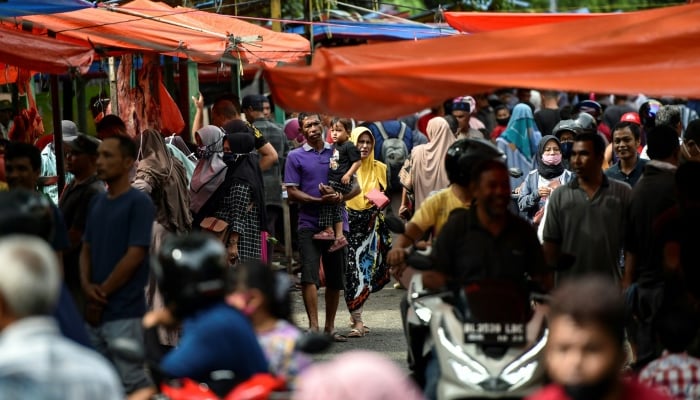Eid-ul-Fitr: Around the world under coronavirus lockdowns
Muslims around the world began marking a sombre Eid al-Fitr Sunday, many under coronavirus lock-down but lax restrictions offer respite to worshipers in some countries despite fears of skyrocketing infections.
The festival — one of the most important in the Muslim calendar marking the end of the holy month of Ramadan — is traditionally celebrated with mosque prayers, family feasts and shopping for new clothes, gifts, and sweet treats.
But this year, the celebration is overshadowed by the fast-spreading respiratory disease, with many countries tightening lock-down restrictions after a partial easing during Ramadan led to a sharp spike in infections.
Further dampening the festive spirit, multiple countries — from Saudi Arabia to Egypt, Turkey, and Syria — have banned mass prayer gatherings, a festival highlight, to limit the spread of the disease.
Saudi Arabia — home to Islam's holiest sites — began a five-day, round-the-clock curfew from Saturday after infections more than quadrupled since the start of Ramadan to around 68,000 — the highest in the Gulf.
Eid prayers will be held at the two holy mosques in the cities of Makkah and Madina "without worshipers", authorities said on Saturday, citing a royal decree.
Makkah's Grand Mosque has been almost devoid of worshipers since March, with a stunning emptiness enveloping the sacred Kaaba — a large cube-shaped structure towards which Muslims around the world pray.
Jerusalem's Al-Aqsa mosque — Islam's third holiest site — will reopen to worshipers only after Eid, its governing body said.
In Lebanon, the highest religious authority has announced the reopening of mosques only for Friday prayers. Worshipers, however, will be subject to temperature checks and sanitary controls before they enter.
Fears of 'new peak'
Meanwhile, Muslims across Asia — from Indonesia to Pakistan, Malaysia, and Afghanistan — thronged markets for pre-festival shopping, flouting coronavirus guidelines and, sometimes, even police attempts to disperse large crowds.
"For over two months my children were home bound," said Ishrat Jahan, a mother of four, at a bustling market in the Pakistani city of Rawalpindi. "This feast is for the kids, and if they can't celebrate it with new garments, there is no point in us working so hard throughout the year."
Pakistan, which gave into religious pressure by allowing mosque prayers throughout the fasting of Ramadan, is yet to make a decision over mass gatherings during Eid.
In Indonesia — the world's most populous Muslim nation — people are turning to smugglers and fake travel documents to get around bans on the annual end-of-Ramadan travel that could send infections soaring.
More than 3,500 Tunisians who traveled home just ahead of the holiday will have to spend it away from their families, forced to quarantine for two weeks in hotels after arriving from abroad.
Atef Maherzi, a doctor repatriated Tuesday from Saudi Arabia, said she would be catching up with family over Skype, foregoing her usual role of host.
"Usually, I'm the mistress of the house but this time, my husband will receive the guests alone."
The COVID-19 death tolls across the Middle East and Asia have been lower than in Europe and the United States but numbers are rising steadily, sparking fears the virus may overwhelm often underfunded healthcare systems.
Iran, which has experienced the Middle East's deadliest outbreak, has called on its citizens to avoid travel during Eid as it battles to control infection rates.
Iran shut schools and places of worship and banned inter-city travel for the Persian New Year holidays in March, but the restrictions were recently eased.
Health Minister Saeed Namaki said that the country was focusing hard on avoiding "new peaks of the disease" caused by people "not respecting health regulations".
The exact date of Eid has yet to be set in the country but will likely be Monday, in line with the community's celebrations in Iraq, as announced by top cleric Grand Ayatollah Ali Sistani.
Iraq will mark the start of the festival on Sunday.
'Comedy night'
The neighboring United Arab Emirates (UAE) has tightened its lock-down, with the night-time curfew starting at 8pm (1600 GMT) instead of 10pm during Ramadan.
But that has not stopped some families from planning getaways to luxury beachfront hotels in Ajman or Ras Al-Khaimah emirates.
However, Muslims in many countries are set for frugal celebrations amid growing financial distress.
The twin shocks of coronavirus restrictions and falling oil prices have plunged the region into the worst economic crisis in decades.
The coronavirus restrictions have hit businesses hard, including retailers who would normally be preparing for the festive rush, as Muslims save their money for masks, gloves, and other COVID-19 protective gear.
In the Syrian capital Damascus, Eid shoppers rummaged through flea markets for clothes at bargain prices as the war-ravaged and sanctions-hit country grapples with a much more entrenched economic crisis.
"The flea market is the only place I can buy something new to wear for the Eid holidays," 28-year-old Sham Alloush told AFP.
"Had it not been for this place, I wouldn't have been able to buy new clothes at all."
But promising some laughs in these dire times, 40 Muslim comedians from across the world will host a virtual show on Sunday called "The Socially Distant Eid Comedy Night".
"This Ramadan has been particularly difficult for communities around the world," said Muddassar Ahmed, head of the Concordia Forum, the organiser of the event.
"We're proud to be pulling together some of the brightest Muslim comedic talent to entertain those celebrating the Eid festival at home, people looking to learn a little bit about Muslim culture, or really anyone in need of a good laugh."
Eid-ul-Fitr: Around the world under coronavirus lockdowns
![Eid-ul-Fitr: Around the world under coronavirus lockdowns]() Reviewed by Muhammad Umar
on
May 25, 2020
Rating:
Reviewed by Muhammad Umar
on
May 25, 2020
Rating:







No comments:
Post a Comment